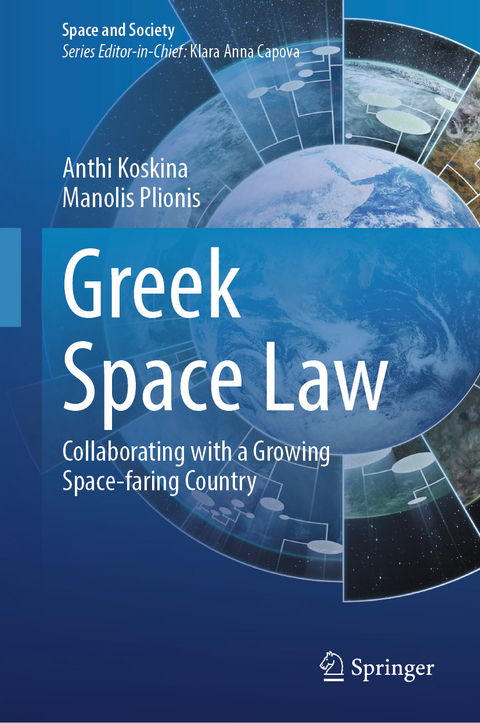
Greek Space Law
Springer International Publishing (Verlag)
978-3-031-72812-9 (ISBN)
- Noch nicht erschienen - erscheint am 10.01.2025
- Versandkostenfrei
- Auch auf Rechnung
- Artikel merken
This book provides an overview of the Greek legislation applying to space activity under the responsibility of the Greek State, as in line with international space law. Greece is not an established space-faring country; however, it is showing particular dynamism, making the most of its participation in international and EU space endeavors. Indeed, along with outstanding achievements in space science Greece took legislative action both at the international and national levels (proposals at the UNCOPUOS; Greek space law; signing of the Artemis Accords).
Hence, the time has come to refer to - and present aspects of - the Greek space legislation. After an introductory section, the book provides information first on the national laws providing for the Greek participation in international space systems and in EU activities, which could be regarded as being the initial steps of Greece in the context of space. Thereafter, the rules applying to Greek space activity per se are presented, focusing on the authorities competent to decide on space matters, then on the substantial law rules allowing for - and clarifying - the application of international space law to domestic space operations.
This book presents an overall view and analysis of the Greek space legislation, adding valuable information to the existing bibliography. Included as an appendix is a scholarly translation of the 2017 Greek space law.
Anthi Koskina: Professor of Law, Collège Idef-PARIS XIII, Athens, Greece (2015); Research Fellow, Athens Public International Law Center (AthensPIL), National and Kapodistrian University of Athens, Greece (2015). She obtained her PhD Cum Laudae on "The right to conduct scientific research", from the National and Kapodistrian University of Athens (2011), later published as a monograph (Nomiki Bibliothiki Eds., 2013). She was the recipient of a fellowship for young researchers, co-funded by the Greek Ministry of Economy and the EU (NSRF 2014-2020), to conduct research on "Artificial Intelligence and Space Law" (2019). She has been elected to take part in the prestigious International Visiting Professor Program 2020, under the "University of Science and Technology of China Fellowship Initiative" (Hefei, China). She is collaborating with the National Observatory of Athens (NOA), Greece, on Space Law matters (2020). She is a member of the Hellenic Society of International Law and International Relations (HESILIR), the European Society of International Law (ESIL), the European Center for Space Law (ESA - ECSL) and a Lawyer at the Athens Bar (2002). She has published articles on Space law (including Space Technologies, Space AI and Space Big Data); Science, Technology & law; Artificial Intelligence Law and Environmental Law in national and international journals, and participated in several national and international conferences on these topics.
Prof. Manolis Plionis: Director and President of the Board of Directors of the National Observatory of Athens-NOA; Professor at the Physics Department of the Aristotel University of Thessaloniki; visiting Professor at the European University of Cyprus; Coordinator of the National Network for Climate Change-CLIMPACT; ex-President of the Sectorial Scientific Council on the Environment, Energy and Sustainable Mobility (2020-2022); ex-Member of the European Space Science Committee-ESF (2017-2022); member of the Greek National Committee for Astronomy and member of the Editorial Board of the International Journal of Modern Physics D. He was born in Athens in 1960 and received a Mathematics degree from the University of Crete and a PhD in Observational Cosmology in 1989 from the University of Sussex. He was a postdoctoral researcher at the SISSA International Research Center in Italy for about 5 years, out of which 2 as an E.C. Marie Curie Fellow (under the Human Capital and Mobility program) and at the International Center of Theoretical Physics for 1 year. He returned to Greece in 1995 as a Researcher at the National Observatory of Athens where he stayed until 2012. He was a visiting Researcher for more than 15 years at the Institute INAOE of Mexico. His research interests are related to Observational Cosmology and Extragalactic Astrophysics using ground and space observatories, while his recent scientific interests extend to issues of Climate Change and associated natural disasters. He has published over 240 scientific articles, many popular science and policy articles while he has supervised many Doctoral and Master dissertations. He has organized many scientific conferences in Astrophysics and Cosmology as well as 2 Hellenic workshops on Natural Disaster Management: in November 2017 and in November 2019 in collaboration with 10 other Research Centers.
Accession to international space law instruments and organizations.- Impetus gained from the involvement in regional EU space initiatives.- Competent State and non State Greek authorities.- Greek legislation on space activities.
| Erscheint lt. Verlag | 10.1.2025 |
|---|---|
| Reihe/Serie | Space and Society |
| Zusatzinfo | XVI, 221 p. 5 illus., 4 illus. in color. |
| Verlagsort | Cham |
| Sprache | englisch |
| Maße | 155 x 235 mm |
| Themenwelt | Naturwissenschaften ► Physik / Astronomie ► Astronomie / Astrophysik |
| Recht / Steuern ► EU / Internationales Recht | |
| Sozialwissenschaften | |
| Technik ► Luft- / Raumfahrttechnik | |
| Schlagworte | EU member State space policy • European Space Council • Greek Ministry of Digital Governance • Greek space activity • Greek Space authorities • Greek space legislation • Greek space sector • Greek strategy for space • Hellas Sat • Hellenic Association of Space Industry (HASI) • Hellenic Space Agency S.A. • Hellenic Space Center • Law 4508/2017 • Law 4623/2919 • National space law • UN COPUOS • UPSsat |
| ISBN-10 | 3-031-72812-2 / 3031728122 |
| ISBN-13 | 978-3-031-72812-9 / 9783031728129 |
| Zustand | Neuware |
| Haben Sie eine Frage zum Produkt? |
aus dem Bereich


